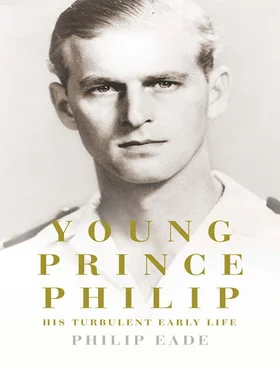In June 1902, she went to stay at Buckingham Palace for the coronation of King Edward VII, and met Andrea, Queen Alexandra’s nephew, who appeared to her to be ‘exactly like a Greek God’, so she later told her grandson Prince Charles. 16The coronation was delayed at the last minute when the king fell ill with appendicitis, but there was still time before the various guests dispersed for Andrea and Alice to fall in love and become privately engaged. Alice’s mother Victoria later admitted that to begin with she was not in favour of this arrangement, thinking them too young. 17It was also said – though she did not admit this – that she thought her daughter could do better than the fourth son of the insecure and impecunious King of Greece.
In July Alice and her mother returned home to Heiligenberg, from where she wrote to Andrea every day. On one occasion, when a week had gone by without a letter from him, a friend found her in tears, tormented by the thought that something must have happened to him or that he had changed his mind. The next morning she arrived at school glowing, having just received five letters in the post from Greece. 18
After an emergency operation to remove his appendix, Edward VII was well enough to be crowned in early August and Andrea and Alice returned to Buckingham Palace and travelled in the same carriage to Westminster Abbey, together with Alice’s mother and Andrea’s elder brother, George. After the coronation there was a further separation while Andrea was away on military duty in Greece, but in May 1903 he returned, Edward VII gave his consent and their engagement became official. The announcement came as a shock to some of the snootier European royalty, the octogenarian Grand Duchess of Mecklenburg-Strelitz bemoaning ‘the very youthful betrothal, so odd, no money besides!’ She even questioned the attendance of Andrea’s aunt, Queen Alexandra, at the wedding: ‘Why? There is surely no reason for it, a Battenberg, daughter of an illegitimate father, he a fourth son of a newly baked King!’ 19
Still, the wedding at Darmstadt in October was a spectacular event and drew an impressive array of European royalty. Among those present was Tsar Nicholas II – Andrea’s first cousin, son of his aunt Dagmar, and husband of Alice’s aunt Alix – who gave the couple a Wolseley motor car and threw a bag of rice in Alice’s face as the couple drove away in it. 20Three hundred and fifty Russian detectives patrolled the town to ensure the tsar’s safety. 21
There were two religious ceremonies, Protestant and Russian Orthodox, the first preceded by a thirty-strong royal procession into the chapel, followed by Andrea and his parents, and lastly Alice with hers. During the nervous exchange of vows, Alice was defeated by the bushiness of the priest’s beard and failed to lip-read the questions, so when asked whether she consented freely to marriage she replied ‘No’, and when asked whether she had promised her hand to someone else she said ‘Yes’. 22
They began their married life in a wing of the royal palace in Athens, spending summers at Tatoï or with her parents in England, Malta and Germany. Their first child, Margarita, was born in 1905, and that autumn they all moved to Larissa, a garrison town in Thessaly on the Turkish border, where Andrea was responsible for transforming mountain goatherds into cavalrymen. 23Shortly after their return to Athens the following spring, their second daughter, Theodora, known in the family as Dolla, was born.
In 1907 the Greek royal family came under attack in the local press due to inflated estimates of the king’s wealth and a rumour that the princes were to receive annuities. ‘To be remunerated for doing nothing is the privilege of the Russian Grand Dukes,’ snarled one newspaper. In another the princes were accused of failing to take the lead in times of trouble, and of ‘loafing about the boulevards of Paris’ while Salonika was set ablaze by Bulgarians in 1902. 24The British ambassador Sir Francis Elliot considered the charge of indifference undeserved and the criticisms ‘characteristic of this country where liberty is confounded with license, and disrespect for authority mistaken for independence’. 25
The rumblings continued, though, and in August 1909 disgruntled officers launched a coup d’état, with the aim of installing the charismatic Cretan nationalist Eleftherios Venizelos as prime minister and preventing the sons of the king from holding any high commands in the army. Andrea had by then completed his staff college exams but, for their father’s sake, he and his four brothers resigned their posts, leading to three years of demoralizing unemployment. 26In 1912, though, he was able to resume his military career when Greece entered the First Balkan War against Turkey, with the aim of expanding Greek territory towards Constantinople and resolving the ownership of Crete. Andrea and his brothers made for Larissa to join the conquering army led by their eldest brother, Crown Prince Constantine, which then swept victoriously through southern and western Macedonia, repeatedly putting the Turks to rout. The campaign not only helped revive the popularity of the Greek princes but also provided Alice with the opportunity for what her biographer Hugo Vickers calls ‘her finest hour’.
Alice was inspired to become a nurse by the example of the grandmother whose name she had been given and more recently by the extraordinary precedent of her aunt Ella, Victoria’s younger sister. Ella was married to Tsar Alexander III’s brother, Grand Duke Serge Alexandrovich, the reactionary and widely disliked governor-general of Moscow. In February 1905 Serge had been blown to pieces by a terrorist bomb thrown at his carriage in the Kremlin. Hearing the explosion, Ella had rushed to the scene and, kneeling in the snow, calmly helped gather up his scattered remains, though other parts were later retrieved from nearby rooftops. 27
The murder brought about a profound change in Ella. Shortly afterwards she visited the assassin at the police station and vainly pleaded with him to repent. She withdrew from society, turned increasingly to her adopted Orthodox faith, became a vegetarian, gave away her jewels and furs, and – inspired by her mother’s ‘Alice Nurses’ at Darmstadt – opened a charitable convent where she lived as the abbess, sleeping on a bare wooden bed with no mattress and one hard pillow, and tending patients herself in the hospital wing. She founded a home for consumptives and an orphanage, and during the October Revolution in 1905 stole out of the besieged Kremlin each day to tend to the wounded in hospital.
Alice had seen for herself her aunt’s work when she visited Russia, and it made a deep impression on her. Since first arriving in Athens she had spent much of her time at the charitable Greek School of Embroidery and at the outset of the First Balkan War she had the school make 80,000 garments for the troops and refugees. 28Then, leaving her three young daughters – her third, Cecile, had been born in 1911 – she went with Andrea and his brothers to Larissa, where in a burst of manic energy she established a hospital after finding that the army had no plan for one. ‘I myself forced the Military Authorities to fit out an operation room in 24 hours,’ she wrote to her mother. 29Realizing it was taking fourteen hours for the wounded to be transported from the front, she then moved her hospital to the recently liberated town of Elassona at the foot of Mount Olympus, requisitioning a school and raiding Turkish houses for mattresses and bedding for 120 men. Alice was in the thick of it, changing bandages on ‘ghastly’ wounds, helping the doctors in ‘fearful operations, hurriedly done in the corridor amongst the dying and wounded waiting for their turn’, with barely any light, the battle still raging all around them, and scarcely any time for sleep between each batch of arrivals. ‘God! What things we saw!’ she wrote. ‘Shattered arms, and legs and heads, such awful sights – and then to have to bandage those dreadful things for three days and three nights. The corridor full of blood, and cast-off bandages knee high.’ 30
Читать дальше












